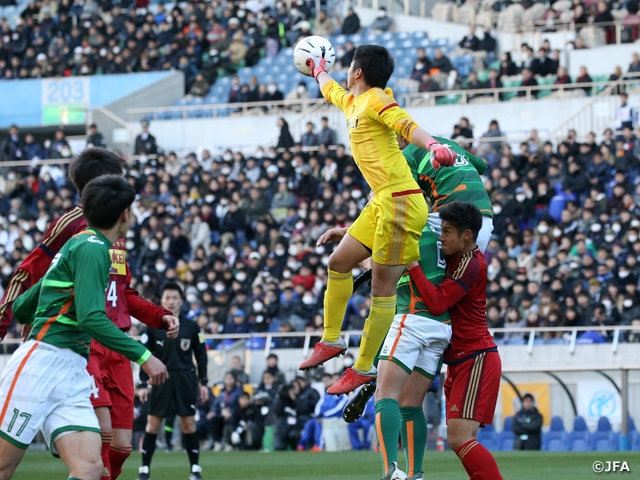NEWS
Multi-angle efforts are needed to eliminate violence - Always have respect Vol.71
22 April 2019

While the entire football community has been striving to eliminate violence, another tragical incident was reported in February. It was reported that a coach of a junior youth team in Fukuoka was arrested with a charge of inflicting bodily injury and causing a depressed skull fracture to a second-year junior high school player by throwing a storage bag that weighs 2.5kg. (18 February, The Mainichi Newspapers)
The Japan Football Association (JFA) has launched the “Welfare Officer” system in 2014 in efforts to eliminate violence.
The English word “Welfare” is a sophisticated word. The definition of the word contains, “the health, happiness, and fortunes of a person or group.” Once the movement launched by the JFA spread the notion to the public and make this word integrated into the Japanese language, violence might become non-existence from our daily lives.
There are three types of Welfare Officers. General Welfare Officers provide consultation to local players who were physically or verbally assaulted. Match Welfare Officers supervise tournaments and matches to warn people for using abusive language from the team benches and the cheering sections. Lastly, Club Welfare Officers is a person who is arranged within the clubs to be in charge of aforementioned role. The February incident in Fukuoka reinforced the necessity to adapt the Club Welfare Officers with actual authority to all clubs around the nation.
In January, during the AFC Asian Cup held at UAE, an incident occurred in a quarterfinal match between UAE and Australia. A defender from the UAE side, Fares Juma Al Saadi, clashed with an Australian player and fell on the pitch with a concussion. With an apparent loss of consciousness, one of his teammates immediately called for the ambulance, and the Emirati defender was carried off the pitch on a stretcher. Soon after being carried off, however, Fares Juma got back on his feet and insisted that he will keep on playing.
This took place in the final minutes of the match, where his team has taken a one goal lead with no more substitutions allowed. Seeing his teammates fighting with just 10 players on the pitch, Fares Juma’s willingness to return to the pitch was very much understandable. The team doctor failed to convince the defender, as he made his return to the match. However, he stumbled around in the subsequent plays, before his teammates had to remove him from the pitch.
A concussion could be a serious brain injury that can endanger one’s life. Under a normal circumstance, an incident like this would never happen. In situations like this, the coach should seek for advice from the doctor and once the doctor suggests that the player should not play, the player must be removed from the match. But in this incident, with the match entering the final seconds, it seemed like the correct procedure was not taken, which ultimately allowed the player to come back onto the pitch.
When a player is injured or concussed, the authority to make the decision for the player to continue must reside with the doctor. The coach must not have this authority. If we do not make it clear on where this “authority” resides, a player’s life can be endangered.
Similarly, Club Welfare Officers should serve a role just like the doctors. The officer will supervise not only the matches, but the daily training sessions as well, to observe the language and behaviour carried out by the coaches during the team activities. The officers should be given the authority to stop physical and verbal violence in the sport of football.
Of course, the improvement of awareness from the coaches is another important aspect.
The Toronto Soccer Association in Canada has carried out a programme called “Respect in Soccer,” where youth coaches are required to take a course that provides invaluable information about coaching the youth. The course cost $30 and the certificate needs to be renewed every five years.
Currently, the JFA has about 80,000 licenced coaches under their domain. Following the example carried out in Toronto, it might be time for the JFA to adapt a respect programme into their requirements to provide and renew their coaching licences.
In order to make the young football players “happy” through the sport of football, we must give our utmost efforts from every angle possible to eliminate violence.
Written by OSUMI Yoshiyuki (Football Journalist)
*This article was originally posted on the Japan Football Association Newsletter, “JFAnews,” March 2019 edition.
Japan Football Association Newsletter “JFAnews”
The Japan Football Association Newsletter “JFAnews” contains all the information on the Japan National Team, and all the events hosted by the JFA. Tournament results and team information throughout the nation are also available. The official monthly magazine is a must read for coaches, referees, and all members of the football family.
For information on the newest edition (Japanese website)
Latest News
-
National Teams
2025/07/03
SAMURAI BLUE (Japan National Team) squad & schedule - EAFF E-1 Football Championship 2025 Final Korea Republic

-
National Teams
2025/06/28
【Match Report】Nadeshiko Japan Fall 1–3 to Spain

-
National Teams
2025/06/24
U-16 Japan National Team squad & schedule - China PR Tour: CFA PEACE CUP (7/1-9@Shenyang, China PR)

-
National Teams
2025/06/19
U-17 Japan Women's National Team squad & schedule - USA Tour (6/21-7/3@Kansas City, USA)

-
National Teams
2025/06/17
Nadeshiko Japan (Japan Women's National Team) squad & schedule - EAFF E-1 Football Championship 2025 Final Korea Republic (7/6-17@Korea Republic)



